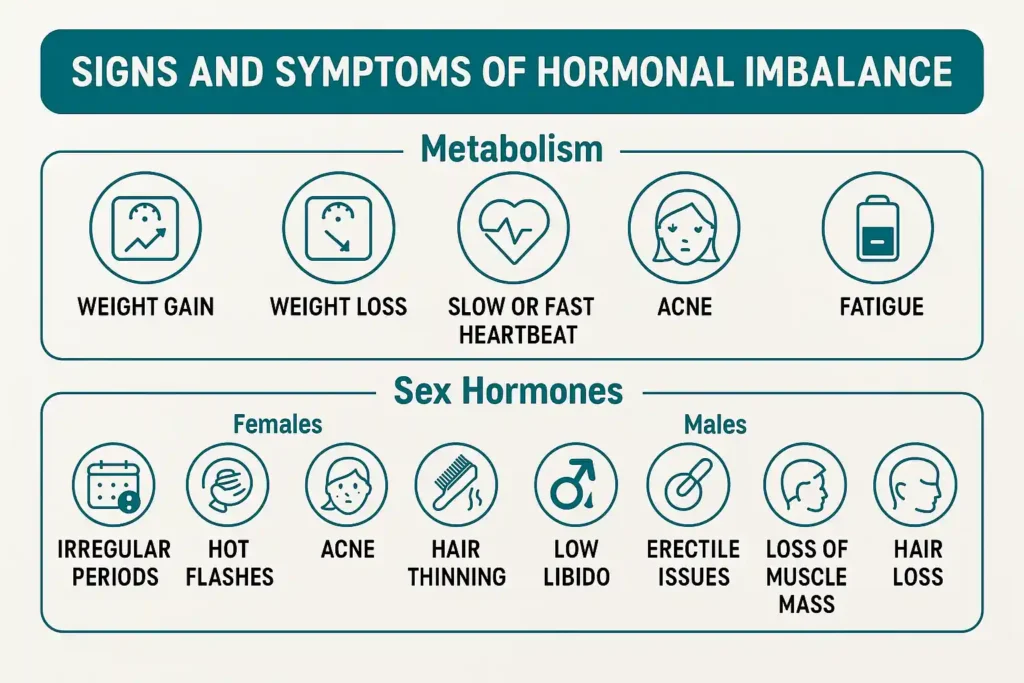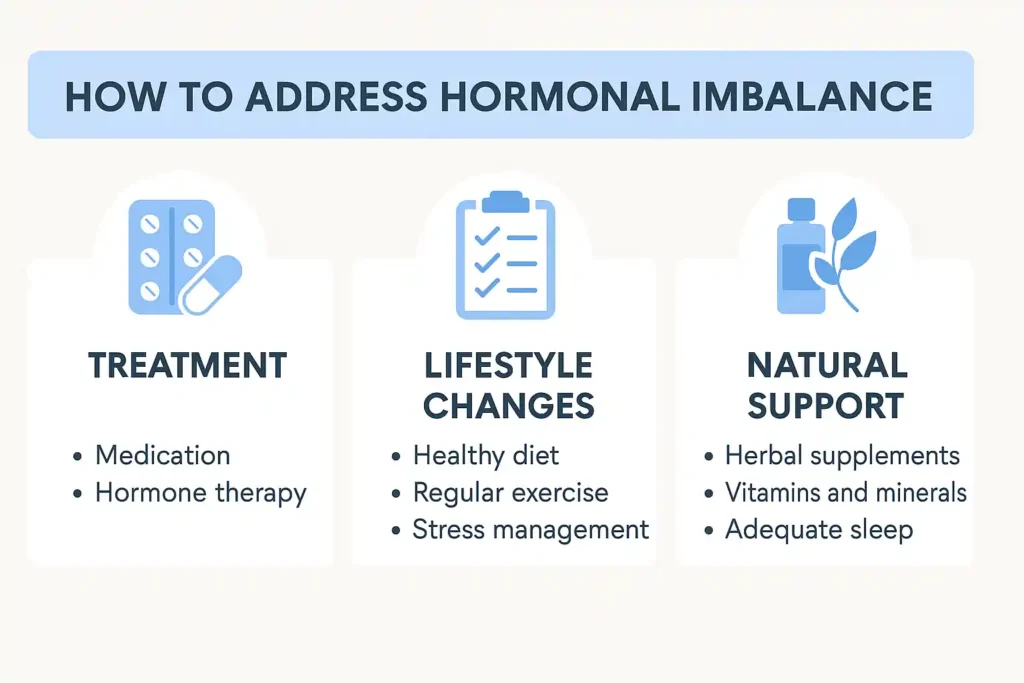A hormonal imbalance occurs when the hormone levels in your body are either too high or too low. This small shift can trigger big changes in how you feel, think, and look. From unexplained weight gain to constant fatigue, mood swings, and even fertility problems, hormone changes can sneak into your life without warning.
Let’s break this down in a way that’s easy to understand.
What are hormones?
Hormones, which are chemical messengers produced by your endocrine glands, circulate through your bloodstream to various organs and tissues, instructing them on their functions and timing.
These include thyroid hormones, insulin, estrogen, progesterone, testosterone, cortisol, and many others. Even a small change in hormone levels can affect your health.
What is a hormonal imbalance?
A hormonal imbalance happens when you have too much or too little of a hormone. Since hormones control many body functions, this imbalance can cause noticeable health problems. Both short-term and long-term, moderate and severe, are possible.
What conditions are caused by hormonal imbalances?
Some health issues linked to hormone problems include:
- PCOS (polycystic ovary syndrome)
- Diabetes (linked to insulin resistance)
- Thyroid disorders
- Adrenal fatigue
- Menopause or andropause
- Endocrine system disorders like pituitary dysfunction
What are the signs and symptoms of hormonal imbalance?

The symptoms of hormonal imbalance can vary based on the specific hormone that is affected.
Hormone imbalance symptoms that affect your metabolism
- Sudden weight gain or weight loss
- Slow or fast heartbeat
- Extreme fatigue
- Feeling unusually hot or cold
Sex hormone imbalance symptoms for females
Hormonal imbalance symptoms in females may include:
- Irregular or missed periods
- Hot flashes
- Acne
- Hair thinning or unusual hair growth
- Low libido
- Mood changes
These can be linked to estrogen imbalance, low progesterone levels, or other sex hormone shifts.
Sex hormone imbalance symptoms for males
Hormonal imbalance in men can lead to:
- Low sex drive
- Erectile issues
- Loss of muscle mass
- Fatigue
- Hair loss
A common cause is testosterone deficiency.
Can hormone imbalance cause weight gain?
Yes. Changes in thyroid hormones, insulin, cortisol, or sex hormones can make your body store more fat. This is why some people gain weight even without changing their eating habits.
Can hormone imbalance cause anxiety?
Yes. Hormones affect your brain chemicals. For instance, low progesterone, fluctuations in estrogen, and elevated cortisol levels may lead to anxiety, mood swings, or depressive symptoms.
What causes hormonal imbalances?
What causes hormonal imbalance varies from person to person, but common triggers include:
Tumors, adenomas and growths
Abnormal growths in hormone-producing glands can lead to overproduction or underproduction of hormones. These may require surgery, medications for hormone regulation, or hormone therapy.
Damage or injury to an endocrine gland
Injury from accidents, infections, or surgery can affect how glands make hormones. This damage can lead to chronic imbalance that might need hormone replacement therapy (HRT) or other treatments.
Autoimmune conditions
Diseases like Hashimoto’s thyroiditis and type 1 diabetes cause the immune system to attack glands, disturbing hormone levels. Functional medicine for hormones often includes addressing immune health and supplements for hormone support.
How are hormonal imbalances diagnosed?

Diagnosis starts with your symptoms and medical history. Testing for hormone levels in blood, urine, or saliva reveals if they are too high or too low. Imaging scans may check for gland problems. Accurate testing helps guide curing hormonal imbalance with the right approach.
How are hormonal imbalances treated?
Treatment of hormonal imbalance depends on the cause. Options include:
- Bioidentical hormones or hormone treatment to replenish deficient hormones
- Medications for hormone regulation for overactive glands
- Hormone detox and balancing hormones naturally through diet, stress control, and exercise
- Supplements for hormone support to fill nutrient gaps
Medical treatment and lifestyle modifications are frequently combined to effectively treat hormonal imbalances.
How do you fix hormonal imbalance?
When asking how to fix hormonal imbalance, think long term. Work with a healthcare provider to treat the cause, not just the symptoms. A plan may include natural remedies for hormone balance, diet for hormone balance, and stress management. Curing hormonal imbalance also means avoiding processed foods, sleeping well, and staying active.
What kind of doctors treat hormonal imbalances?
Endocrinologists specialize in hormones, but gynecologists, urologists, and general practitioners may also treat hormone problems. Some patients choose doctors trained in functional medicine for hormones for a whole-body approach.
How can I prevent a hormonal imbalance?
You can lower your risk with lifestyle changes for hormonal health:
- Eat foods to help hormonal imbalance daily.
- Exercise regularly.
- Sleep 7–9 hours a night.
- Reduce stress to control cortisol levels.
- Avoid excess sugar to prevent insulin resistance.
When should I see my healthcare provider about a hormonal imbalance?
If you notice signs of hormonal imbalance like rapid weight change, ongoing fatigue, mood swings, or menstrual changes, get checked. Early diagnosis makes curing hormonal imbalance easier and more effective.
Takeaway
- Hormonal imbalance affects physical, mental, and reproductive health.
- Causes range from lifestyle to medical conditions.
- Treatment of hormonal imbalance works best when customized.
- How to fix hormonal imbalance includes both medical and natural steps.
- Eating food for hormonal imbalance supports natural hormone balance.
FAQs
How do I check if I have hormonal imbalance?
Ask your doctor for hormone level testing to measure your hormone levels accurately. It’s the most reliable way to confirm an imbalance and guide effective treatment.
How to fix hormonal imbalance?
Combine medical advice, balanced diet, exercise, and stress control. Include foods to help hormonal imbalance like leafy greens, healthy fats, and lean proteins for long-term results.
What are the 5 hormonal disorders?
They include PCOS, thyroid disorders, diabetes from insulin resistance, testosterone deficiency, and estrogen imbalance. These affect metabolism, mood, fertility, and energy levels significantly.
What are three diseases caused by hormonal imbalance?
Common ones are hypothyroidism, type 2 diabetes, and adrenal fatigue. All require proper diagnosis and targeted treatment to restore hormonal health.
What foods are good for hormonal imbalance?
Focus on food for hormonal imbalance such as whole grains, nuts, seeds, fatty fish, and colorful vegetables to promote natural hormone balance.
What to drink to balance hormones?
Water, herbal teas, and green tea can help support hormonal health by reducing inflammation and improving metabolism naturally.
Can I get pregnant with hormonal imbalance?
Yes, but fertility may be affected. Treatment of hormonal imbalance can improve ovulation and reproductive function, increasing chances of pregnancy.
Which vitamin is good for hormonal imbalance?
Vitamin D supports natural hormone balance and reproductive health by regulating gland function and calcium metabolism.
Can stress cause hormonal imbalance?
Yes. Stress raises cortisol levels, disrupting other hormones. Managing stress helps in curing hormonal imbalance naturally.
What is the right treatment for hormonal imbalance?
It depends on what causes hormonal imbalance. Treatments may include medication, hormone therapy, diet, and balancing hormones naturally through healthy habits.
Which exercise is best for hormone balance?
Strength training, walking, and yoga help improve metabolism, support hormonal health, and reduce stress hormones.
Can iron deficiency cause hormonal imbalance?
Yes. Iron supports endocrine glands and energy production, so deficiency can disrupt hormone production.
What are the mental symptoms of hormonal imbalance?
They include anxiety, depression, brain fog, and mood swings; all linked to shifts in estrogen, progesterone, and cortisol levels.











Leave a Comment